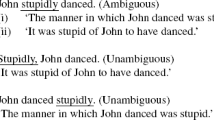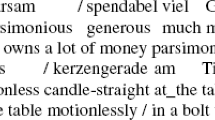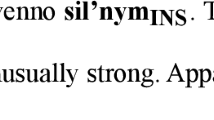Abstract
This paper holds that Kubota’s (2015—this volume) treatment of the clausal/manner distinction among subject-oriented adverbials in Japanese is basically on the right track, although there are a number of areas that need work. Kubota invokes the idea of different comparison classes for the two readings, which seems to get at the distinction correctly; and she makes a plausible case for the manner reading as basic, with the clausal reading induced by the particle -mo. Still, there remain important questions about how this idea would fit into a cross-linguistic account of subject-oriented adverbs, whether it is indeed correct to take the manner reading as basic, and whether her account of passive-sensitivity is adequate.
Similar content being viewed by others
References
Chomsky, Noam. 1981. Lectures on government and binding. Dordrecht: Foris.
Cinque, Guglielmo. 1999. Adverbs and functional heads: a cross-linguistic perspective. Oxford: Oxford University Press.
Ernst, Thomas. 2002. The syntax of adjuncts. Cambridge: Cambridge University Press.
Ernst, Thomas. 2009. Subject-oriented adverbs. Natural Language and Linguistic Theory 27: 497–544.
Ernst, Thomas. 2014. The syntax of adverbs. In The Routledge handbook of syntax, eds. Andrew Carnie, Dan Siddiqi, and Yosuke Sato, 108–130. London: Routledge.
Frey, Werner. 2003. Syntactic conditions on adjunct classes. In Modifying adjuncts, eds. Ewald Lang, Claudia Maienborn, and Catherine Fabricius-Hansen, 163–209. Berlin: de Gruyter.
Jackendoff, Ray. 1972. Semantic interpretation in generative grammar. Cambridge, MA: MIT Press.
Kubota, Ai. (2015, this volume). Transforming manner adverbs into surface-subject-oriented adverbs: evidence from Japanese.
Matsuoka, Mikinari. 2013. On the notion of subject for subject-oriented adverbs. Language 89: 586–618.
McConnell-Ginet, Sally. 1982. Adverbs and logical form: a linguistically realistic theory. Language 58: 144–184.
Piñón, Christopher. 2010. What to do with agent-oriented adverbs. Handout.
Tsujimura, Natsuko. 2007. An introduction to Japanese linguistics, 2nd edn. Malden: Blackwell.
Acknowledgements
I owe thanks to Seth Cable, Ilaria Frana, and Chisato Kitagawa for discussion of the issues herein, and to Chisato Kitagawa, Yoshi Kitagawa, and Naoko Nemoto for help with Japanese data. But I claim responsibility for any errors.
Author information
Authors and Affiliations
Corresponding author
Rights and permissions
About this article
Cite this article
Ernst, T. Evidence for a proper treatment of the clausal/manner distinction: comments on Kubota, “Transforming manner adverbs into surface-subject-oriented adverbs: evidence from Japanese”. Nat Lang Linguist Theory 33, 1047–1055 (2015). https://doi.org/10.1007/s11049-015-9289-5
Received:
Accepted:
Published:
Issue Date:
DOI: https://doi.org/10.1007/s11049-015-9289-5




